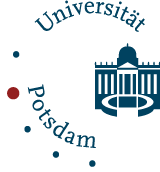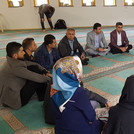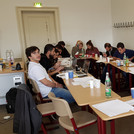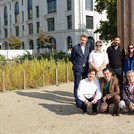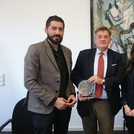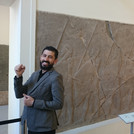Conferences and Workshops in Potsdam 2018
From September 13th to 28th 2018 a group of Erbil academics from Ishik University, Salahaddin University and Catholic University in Erbil was visiting Potsdam. On the homepage of Ishik University you can find a small report about the visit. Following the events of the visit:
September 14 Mosque Visit and City Tour
On Friday, September 14, 2018, the delegation from northern Iraq visited the Al-Farouk mosque in Potsdam. The Muslim guests attended the sermon, held in Arabic, and then performed Friday prayers with imam Kamal Abdallah, while non-Muslim guests from Iraq also had the opportunity to attend. Although they live in an Islamic-informed country, this was likely their first chance to visit a mosque during the main prayer period once a week.
Following the prayer, the sermon and the talk with the imam were translated for the guests who were not conversant in Arabic.
After the imam greeted the delegation, he gave a brief overview of Muslim life in Potsdam. He discussed the religious offerings at the city’s only mosque and the challenges to be overcome. The imam reported on efforts and projects related to interfaith activities and the positive relationships and functional cooperation with the secular state authorities, but he also discussed Islamophobic campaigns against the Potsdam mosque.
Afterwards, Prof. Hafner took the group sightseeing in central Potsdam: the Nikolai Church, the Dutch Quarter, and the Church of Peter and Paul. At the Church of Peter and Paul, the visitors got a glimpse of the sacristy and went to the top of the tower.
During the tour, they learned about topics such as the lives of Muslims in Germany, denominations of Christianity, the relationship of church and state, ecclesiastical architecture, and liturgy.
17.09. "Mapping Erbil" Workshop
Two whole days were devoted to continuing the “Mapping Erbil" project. The representatives from the three universities presented the first portraits of church and mosque congregations, which had been prepared in advance of the visit; the participants had already met in Erbil under the aegis of Prof. Öztas. During the discussion of the illustrated texts, it became clear that the following issues played a role in the mapping of Kurdistan, in contrast how the congregations in Germany were described:
- The historical background of Saddam Hussein’s war against the Kurds in 1990/91, which resulted in a broken relationship to the government in Baghdad and a victim mentality among the Kurds that crosses religions
- The current background of the invasion of Iraqi territory by ISIS and the associated expulsions of both Christians and Yezidis, as well as Muslims
- The role of foundations (endowments) in mosque congregations should be adequately described.
- Congregational life and group diversity must be more intensely studied: it is clear that some mosques are simply for prayers, and that others have far-reaching social involvement.
- Attendance should be differentiated quantitatively in daily, weekly, feast, and life cycle prayers (to put it more informally: pious Muslims, Friday-prayer Muslims, Ramadan Muslims, and “revivalist” Muslims)
- The texts should correspond to scientific standards, e.g., when specifying sources (texts, interviews). A style sheet could help with this.
- The ritual and organizational diversity among mosque congregations should be appreciated and not homogenized. There was a tendency for the Erbil colleagues to portray Islam as a compact, unvarying religion and to emphasize the equality of congregations. The German participants stressed that diversity is not a threat to tawhid, but is instead an expression of its elaboration.
It was agreed that the Erbil researchers would also contact those mosques by phone that they were not able to visit in person. Ishik University has offered to set up a makeshift call center to contact as many of the approx. 300 mosques as possible, with the help of the religious authorities (c/o Mullah Abdullah).
A handbook for conducting interviews has yet to be created, as well as some kind of official advance information, without which no replies should be expected.
September 21 Workshop in the House of One
Report by Osman Örs (theological consultant)
On Friday, September 21, 2018, at 9:30 a.m., we received a delegation from the autonomous region of Kurdistan / Northern Iraq. The visitors were given insight into the project at a reception in the pavilion of the House of One and a tour of Petriplatz. We then walked together to the Protestant Church Forum (Klosterstr. 66). Following coffee and pastries, the Kurdish guests offered an introduction to interfaith and interdenominational encounters in Iraq.
A workshop part followed, in which attendees were divided into three groups. The workshops were led by theological consultants Frithjof Timm and Osman Örs, as well as by our intern, Paul-Bernhard Elwert. Work was done in English on the following topic clusters falling under the following three aspects, which were then presented in a plenary session:
1) A region of different ethnicities and religions – the House of One from an Iraqi perspective
What would a mosque have to look like in order to be welcoming to Sunnis and Shiites alike, as well as others? What are the key elements for encounters of different denominations?
2) Conflicting priorities – between secularization and theology in Iraq
How do secularism and different ethnic and religious groups shape religious thinking and life? What roles do religious actors play in the various contexts (Berlin, Erbil, Baghdad)?
How has the reconstruction period influenced interfaith encounters after ISIS?
3) A great "world house" - A House of One in Iraq?
Does the region need a prospective House of One - and is this even conceivable?
What are some possible sites for interfaith encounters in Iraq? What would these need to look like? What exchanges might be possible? What are some possible obstacles?
In summary, it was a very rewarding encounter that clarified how important it is for a project like the House of One to come from the bottom up rather than the top down. It is important that something like this must subsist and persist on a foundation of many years of interfaith trust.
Nothing stands in the way of Shiites and Sunnis sharing the use of a mosque, as long as minor differences are respected, such as the calligraphic naming of important persons and the placement of certain ritual items such as the (Shiite) prayer stone. The labeling of ritual objects would also be helpful in this regard. Given the modest size of the prayer room, the minbar (pulpit) should also have a modest character, as in the time of the Prophet (a three-tiered mobile wooden minbar).
The day ended at 12:45 with a walk to Friday prayers.
September 24 Panel Discussion on Religious Diversity in Iraq
On Monday, September 24, 2018, a panel discussion on religious diversity in Iraq took place as part of Intercultural Week in Potsdam. Some fifty guests gathered on the third floor of the Wissenschaftsetage Potsdam, despite fact that the opening of the exhibition by Kheder Abdulkarim was taking place at the Potsdam town hall at the same time, with a welcome speech from the mayor. Once all seats had been taken, Dr. Stefan Gatzhammer began with an introduction to the "Religious Diversity Erbil" DAAD project, which was established in January 2018 between the Chair of Religious Studies (SP Christianity) at the University of Potsdam and three universities in Erbil (Kurdistan/Northern Iraq). Dr. Gatzhammer then gave a brief overview of the abundant religiosity and history in the northern Iraq region of Kurdistan by presenting the itinerary of the Potsdam group, which visited the region in April 2018. This was followed by short lectures from the Erbil professors, who focused on the question of how the various ethnic groups (Kurds, Yazidis, Arabs) and religions (Muslims, Christians, Yazidis) are able to coexist together in northern Iraq after the barbarism of ISIS. Ms. Bala from Ishik University opened with a brief overview of the demographics of Kurdistan. She used statistics to give her audience a first look at the religious diversity of the region. According to Ms. Bala, it remains difficult to present exact figures, since migration in northern Iraq engenders new population shifts almost every month. Dr. Ismael of Salahaddin University then offered an introduction as to how the state ensures religious diversity. According to him, the tolerance the various religions have for one another works so well because Kurdistan expressly has a Ministry of Religious Affairs. Lastly, Mr. Shamoon of the Catholic University Erbil reported on the situation of Christians in the region. He praised the efforts of the Autonomous Kurdish Region towards peaceful coexistence, but he also addressed the still very prevalent abuse and oppression of Christians in northern Iraq. These short talks were followed by a panel discussion in which the three presenters and other lecturers from Erbil stepped forward to answer questions from the audience. The ensuing discussion focused in particular on the situation of the Yazidis in the region, which had not been explored before that point. After the discussion, the audience and the Iraqi guests had the opportunity for further conversation over tea, during which they talked about the future of religious diversity in Iraq.
www.potsdam.de/event/religioese-vielfalt-im-irak-religious-diversity-iraq
September 26 Visit to the Topography of Terror exhibition
On Wednesday, September 26, 2018, the members of the delegation from our partner universities visited the "Topography of Terror” permanent exhibition during a visit to Berlin. The director of the Topography of Terror Foundation, Prof. Andreas Nachama, gave them a personal tour. Given their recent experiences in their homeland, the Iraqi visitors had many links to the subject matter of the exhibition, and the visit undoubtedly provided them with an opportunity to engage with their own history.
27.9. Meeting with the Vice President of Potsdam University
September 27 Visit to the Pergamonmuseum
The cultural highlight of the tour program for the Iraqi delegation was the visit to the Pergamonmuseum on Berlin’s Museumsinsel. Dr. Lutz Martin, acting director of the Vorderasiatisches Museum (Museum of the Ancient Near East) and an archaeologist with many years of field experience in Syria and Iraq, welcomed the Erbil guests in fluent Arabic. The highlight of the special tour was the imposing reconstruction of the Ishtar Gate, the archaeological building ensemble from what is now Iraq. The Ishtar Gate was one of the ancient city gates of Babylon and was rebuilt in the Pergamon Museum along with a section of the so-called Processional Way from the sixth century BCE. The renovation of the Museumsinsel has meant that the finds from Uruk (southern Iraq) and the rooms with Babylonian and ancient Iranian monuments are not accessible until 2023, so the group took some interesting side trips to the Antikensammlung (Collection of Classical Antiquities) at the Vorderasiatisches Museum and the Museum für Islamische Kunst. One room is dedicated exclusively to art from Samarra, a city on the Tigris located some 125 kilometers north of Baghdad. In today's Iraq, Samarra is one of the more preeminent sites for Islamic art history and archaeology. This is where the first systematic excavations of an Islamic ruin were performed. From 836 to 883, the city served as the temporary seat of government of the Abbasid caliphs, replacing the actual capital of Baghdad during this time.
Prof. Martin bid a fond farewell to the Iraqi delegation and invited the students and lecturers from Erbil to come for a special guided tour in June 2019 (Summer School in Potsdam).
